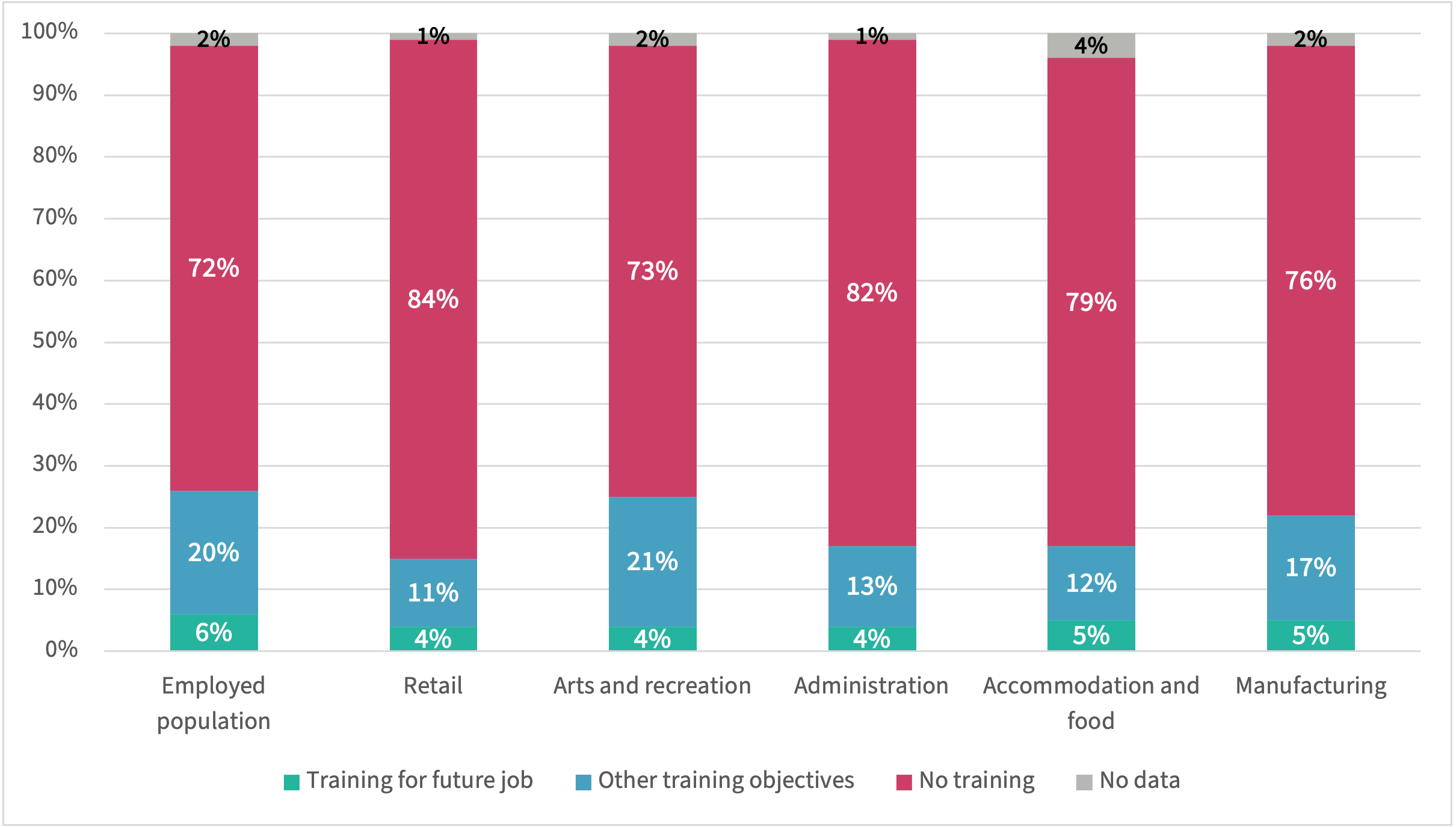UK faces a skills shortage with only 6% of workers upskilling for a new job pre-pandemic
Govt should introduce a new retraining scheme to improve labour market resilience and support the transition to a low-carbon economy, according to the New Economics Foundation
26 October 2021
New analysis from the New Economics Foundation (NEF) finds that only 6% of workers were retraining for a new job pre-pandemic, providing new evidence to explain the UK’s increasing skills shortage. Broken down by sector, just 4 – 5% of workers in areas of the economy hardest hit by the pandemic, like retail and hospitality, were undertaking reskilling in 2019.
The analysis shows how the rate at which employees are upskilling in preparation for new jobs compares with high jobs turnover in the UK. ONS data estimates that 29% of employees changed job from one year to the next pre-pandemic and 17% of employees changed the industry in which they worked.
The research from NEF suggests that the discrepancy between turnover and retraining rates is contributing to the UK’s skills shortage. According to a Department for Education’s Skills Needs Survey, there were an estimated 210,000 ‘skills-shortage vacancies’ (SSVs) in the UK in 2019, up from 85,000 in 2011. The impacts of this number of SSVs in the labour market left 24% of jobs inaccessible to those looking for jobs. In the construction and manufacturing sector over 1 in 3 vacances were hard to fill.
If the government is to ‘level up’ communities across the country, at the same time as rapidly decarbonising the economy, it will need an ambitious plan for retraining the UK workforce according to NEF. The research makes the case that UK skills policy to date, including detail in the government’s net zero strategy last week and the chancellor’s announcement of £500m to help people back into work after the furlough scheme was cut, isn’t enough to meet the urgency and scale of the challenge.
NEF recommends that the government introduces a new Future Skills Scheme, which would offer every working adult facing redundancy, or working within a firm threatened with a significant drop in business activity, the option to upskill or retrain. Features of the scheme include:
- Workers whose employers are willing to put them on short-time work would be eligible for the scheme.
- Employees would need to continue working for a minimum of 40% of their former hours at full pay while enlisted on the scheme. In return, employers would need to guarantee workers access to the training for at least three months.
- Workers enlisted on the scheme would receive pay protection for hours spent training instead of working: up to 80% of full pay on the same terms as the furlough scheme.
- Workers would be free to choose a course or on-the-job training across a wide range of fields, qualifications, and sectors, but with particular focus on opportunities that prepare workers for transition to a low-carbon growth sector, such as care, home retrofit and renewable energy.
- For firms facing only a temporary drop in turnover, employers would be able to take workers back full time after their period on the scheme.
- NEF estimates the scheme will cost £69.5m a month per 100,000 workers on the scheme, including training costs. When considering the savings on Universal Credit made through this scheme, the net monthly costs fall to £41m a month.
- Unlike furlough, the Future Skills Scheme would also include the offer of a redundancy payment to encourage employers who do not expect turnover to recover to place workers at risk of redundancy on the scheme. This would allow workers some time to upskill ahead of their search for a new job.
Frances O’Grady, General Secretary of the TUC, said:
“Working people needed to be protected from future economic shocks as climate change, automation and AI all pose a threat to livelihoods. We need a permanent short time working scheme to protect workers from periods of industrial disruption. And we need a proper skills guarantee – as outlined by NEF – so that people can retrain for the jobs of tomorrow. The pandemic has shown the importance of an active government and we can’t leave everything to the market.”
Alex Chapman, senior researcher at NEF, said:
“The prime minister’s vision of a high-skilled, high-wage economy will not materialise through piecemeal skills programmes. Without urgent action, the UK’s skills mismatch will continue to grow, leaving the labour market vulnerable to future economic shocks and unprepared for the transition to a low-carbon economy.
“There is an unmet demand for upskilling in the UK, with 2016 European Union data showing that 45% of people not undertaking education or training reported that they wanted to be, compared with an EU average of 28%. The barrier reported by over half of people wanting to study was the cost, due to the price of courses and forgone wages during time studying.
“The furlough scheme was a huge, missed opportunity to reinvigorate the UK’s skills base. Our Future Skills Scheme would give employers access to upskilling and revenue support during turbulent times, provide employees a secure income while receiving fully funded training, and see the government progress on its climate targets.”
Contact
Becky Malone, becky.malone@neweconomics.org, 07925950654
Notes to editors
The New Economics Foundation is a charitable think tank. We are wholly independent of political parties and committed to being transparent about how we are funded.
The report Upskilling Britain for a high-wage future will is available here.
Figure 1: Just 4 – 5% of workers in key pandemic impacted sectors were undertaking training in preparation for a new job in 2019.
Reported rates of training by workers employed in selected sectors. Highlighted, the proportion of people undertaking training with the purpose of preparing for a future job, versus those undertaking training for other purposes related to personal interest and their current job

Source: Understanding Society Survey, Wave 10
Topics Work & pay Environment






